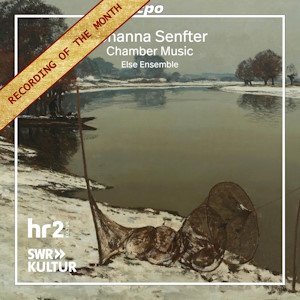
Johanna Senfter (1879-1961)
Chamber Music
Piano Quartet in E minor, op.11 (1911)
Sonata in D major for clarinet, viola, horn and piano, op.37 (1920)
Trio in G major for clarinet, horn and piano, op.103 (1943)
Clarinet Quintet in B flat major, op.119 (1950)
Clarinet Sonata in A major, op.57 (1925)
Kleines leichtes Trio, op.134
Else Ensemble
rec. 2021, Sedensaal, Hessischer Rundfunk, Frankfurt, Germany; 2023, Hans-Rosbaud Studio, Baden-Baden, Germany
cpo 555 495-2 [2 CDs: 129]
The music of Johanna Senfter has taken something of a backseat, and there’s not that much of her music recorded. It’s surprising considering the substantial oeuvre of compositions to her name. These include 8 symphonies, 3 violin concertos, single concertos for piano and viola, string quartets, piano trios, choral music and lieder and a healthy crop of piano music. Maybe one reason for this neglect is the fact that she turned her back on modern trends such as twelve-tone technique and serial composition. She was born in Oppenheim in 1879, and died there in 1961. She studied at the Hoch Conservatory in Frankfurt – composition with Iwan Knorr, violin with Adolf Rebner and piano with Karl Friedberg. After completing her diploma, she became a private pupil of Max Reger in Leipzig. Reger greatly admired her as a composer and did much to champion her music.
The earliest work here is the four movement late Romantically etched Piano Quartet in E minor, op.11, dated 1911. The opening movement is cast on an orchestral scale, the music is both opulent and sumptuous, with the piano writing richly woven. There follows a movement of glowing intimacy. Next come some imaginatively constructed variations. The finale is grandiose in style, and is enhanced by some skillful harmonic modulations.
The Sonata in D major for clarinet, viola, horn and piano, op.37 was penned almost ten years later, and sits in what is regarded as Senfter’s middle creative period. What a wonderful combination of instruments the composer harnessed for this intriguing score, namely three alto instruments and piano. They really complement each other. There are four movements, of which the central two I found the most interesting. The second is a sprightly scherzo, and it precedes a sombre fugal slow movement.
Clarinet, horn and piano are employed once again in the Op. 103 Trio. It’s a much later work, composed in 1943 and, as the booklet states “is marked by the intensified employment of chromaticism, heightened dissonant richness and composite harmony”. There are three movements. The two outer movements are animated and spirited, and bookend a sombre and austere Langsam. Most probably the composer was reflecting on the ravages and terror of war.
Another late work, this time from 1950, is the three movement Clarinet Quintet in B flat major, op.119. It’s a tribute to Brahms and Senfter’s teacher Max Reger, whose Clarinet Quintets she obviously admired. It opens in animated fashion. The second movement is rather brooding, with tortuous chromatic harmonies. It’s only in the finale that the composer injects some playful insouciance into the proceedings.
We turn the clock back to 1925 for the Clarinet Sonata in A major, op.57. It took another seven years for it to be premiered by Alois Spranger (clarinet) and Rudolf Schwartz (piano) in Karlsruhe in 1932. There’s an element of restlessness in the opener, whereas the middle movement is wistful and longing. The finale is flowing and romantically buoyant.
There’s no exact date given for the Easy Little Trio, but its high opus number indicates that it was one of the composer’s last completed works. It’s scored for violin, cello and piano and is cast in a Baroque mould – Menuett, Sarabande and Gavotte. It is a brief work lasting just over seven minutes.
This release has given me a great deal of enjoyment, and is one I will certainly return to again.
The Else Ensemble give masterful and deeply committed performances, enhanced by superb balance and sumptuous sound. This is their debut album, and it’s a triumph. The liner notes, in German and English, are detailed and excellent in every way.
Stephen Greenbank
If you purchase this recording using a link below, it generates revenue for MWI and helps us maintain free access to the site



















